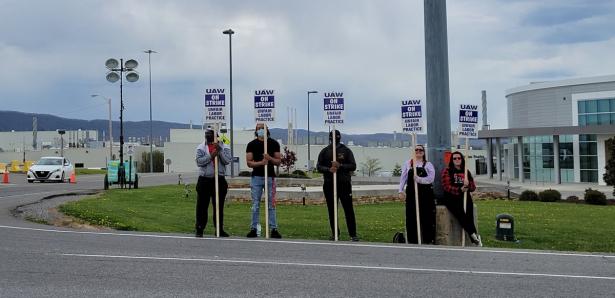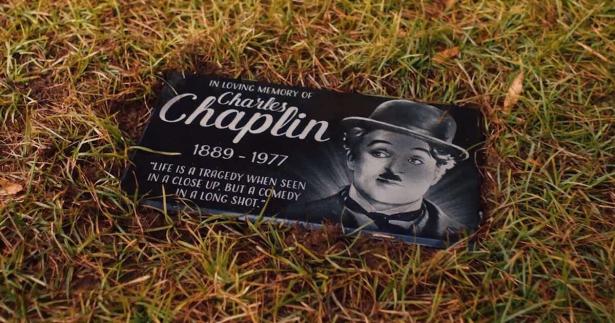Friday Open Thread ~ "Looking back at the headlines" edition~ a jobs report & stolen remains

One thing I think getting missed is that the US decided to let everyone get laid off and do its subsidies through expanded unemployment, rather than the type of furlough scheme done in the UK, where the government stepped in to pay the wages so that people could remain in jobs. The result of this is that people feel no loyalty to old work and have every reason not to—so why return to those crap conditions? Your boss was happy to dump you off the payroll, possibly while getting a federal bailout, but now they’re complaining that you don’t want to come back?
Also: The first round of expanded unemployment gave people $600 a week extra. That was hardly eating-bonbons money, yet we heard about people having the ability to pay the bills for the first time with it. That expired, and I’ve spoken to workers who spent months wondering what would happen to them. The persistent story since the last crisis was pervasive underemployment—2008 wiped out a lot of middle-wage jobs and replaced them with low-wage jobs.
So the re-expanded deal was $300 extra a week—the equivalent of $7.50 an hour at 40 hours. These are not cushy benefits in the least! A one-time stimulus check of $600 and then another of $1,400 (which by the way a lot of people haven’t gotten, including, er, me) is definitely not “retire and watch HBO” money. What it is is exactly what unemployment was designed to do: allow people to have some breathing room before having to accept the first crappy job that came along. That’s the point of unemployment insurance, which we pay into so that it’s there when we need it. That this is some government handout is utterly ridiculous, and it harks back to the godawful days of the welfare queen narrative.
May 13 marked 36 years since a home occupied by MOVE, a Black radical liberation group, was bombed by police. As MOVE members marked the anniversary this year, they also are demanding justice after new information revealed the remains of two children, Tree Africa, age 14, and Delisha Africa, age 12, killed in the 1985 bombing are being used for research at the University of Pennsylvania and Princeton University. On this episode, we revisit what happened and hear from MOVE members and supporters seeking justice.
MOVE Demands Justice for Children and The Return of Stolen Remains
Let the Fire Burn explores the controversial, 1985 clash between police in Philadelphia and MOVE, a radical, non-violent, back-to-nature group. After a standoff with the group MOVE, Philadelphia Police dropped a bomb on the roof of MOVE’s home, killing 11 people including five children, and destroying approximately 61 homes. Thirty-five years later, Philadelphia is still known as “The City that Bombed Itself.” The city’s brutal show force, unjustified to many, exists as part of a decades-long tradition of violent policing aimed at African-Americans.
Factory workers at a Volvo truck plant in southwest Virginia voted by 91 percent Sunday not to ratify a concession-filled contract negotiated by local and International Auto Workers (UAW) officials.
After Strike, Workers Resoundingly Reject Contract at Volvo's Virginia Truck Plant
May 19 is the birthday of Ho Chi Minh, the revolutionary that led the Vietnamese people through victorious war and revolution from the 1920s to his death in 1969. This 20-year old review is of the best biography of Ho available in English.
In 1978 body snatchers really did dig up and try to ransom the corpse of the legendary actor Charlie Chaplin shortly after his death. 'Stealing Chaplin' uses this fact-based bit of skullduggery as a mere launching pad for its fact-free comedy.
Stealing Chaplin: Film Review







Comments
This from the Food and Agricultural Organization
of the United Nations ...
yesterday was World Bee Day (pollinators)
http://www.fao.org/publications/highlights-detail/en/c/1398922/
today is International Tea Day
http://www.fao.org/home/en/
ho-hum
Thanks for the OT philly!
Zionism is a social disease
Positive news from Oregon
Five more (for a total of seven, so far) Oregon counties vote in favor of ditching Oregon to join with Idaho.
More here
Idaho is all for it, apparently - as are a number of Washington counties, but it faces a tough slog in Washington and Oregon.
While there are precedents and procedures for forming new states out of existing ones or redrawing state boundaries, the procedures are cumbersome and high-population areas can override the wishes of rural ones. Which is what is at the heart of most of these movements, anyway and urban/Blue v. rural/Red tensions are evident in any number of states: NY, CA, WA...
Seems like the process needs to be streamlined, somehow.
Anyhow, the margins this time were pretty convincing, Leave beating Stay by an average 68% to 32%.
Disclosure: I'm a long-time supporter of the similar (and active) State of Jefferson movement which aims for Southwestern Oregon and Northern Cal. to split off and form an entirely new state. soj51.org
That and an expanded Idaho that included much of what is now Eastern WA and OR would be ideal, but Greater Idaho has a better chance to be realized as there are fewer procedural hoops to jump through...
"Let my people go!"
One can't help but wonder if there isn't a way to allow
the stay portion to stay, especially if they are concentrated, such as in a city. My concern is situations like with South Ossetia whereby a grooup gets to incorporate a coherent stay enclave into their breakaway state by simply including it in the boundary of their break-away plebescite.
For example, if Jefferson were to include only CA counties for simplicity sake, and the rural areas voted 90% leave but Arcata voted 80% stay, for a net 60 or better combined "leave" vote. Should not there be a mechanism whereby Arcata would be allowed to stay?
be well and have a good one
That, in its essence, is fascism--ownership of government by an individual, by a group, or by any other controlling private power. -- Franklin D. Roosevelt --
Too many "confederates" . . .
, the supporters of the state of Jefferson are rather like too many of the early settlers of Eastern Oregon.
It seems they have traded their white hoods for Trump flags, MAGA hats, and as they can't organize a lynching they opt for 'Rollin' Coal' in their oversized pick-um-ups. I wish we could banish them to the pacific gyre.
Looks like a pipline route for the liquified natural gas
terminals for export at Jordon Cove at Coos Bay, Oregon the state of Oregon keeps blocking.
Disclosure: I am not interested having the international corporations controlling Idaho politics disrupting my life. If I did, would move to Idaho.
Propaganda is getting thick. The "little" folk are being used for their votes. Same pattern as the Big Timber interests used on rural voters for profit.
Still yourself, deep water can absorb many disturbances with minimal reaction.
--When the opening appears release yourself.
At a local hearing
, we gave "testimony" regarding that pipeline project. We were out numbered by the crowd backed by corporate money. These worthies were "organized" and "prepped" to read testimony containing unfamiliar words into the record. The proceedings were so very predictable that even Cliff Bentz slipped out prematurely.
Creating and maintaining hostilities between parties
is a effective tactic of corporate interests. Name calling helps to diminish the commonality of the human experience and the potential to build communication bridges. Agent provocateurs are on both sides of the major conflict to keep the disdain for the others at the forefront of our thought and actions. We do not have to fall into their plans by playing out the us vs them roles.
Oregon's first settlements were created with corporate money and it has been a progression of minority (meaning small number not ethnicity) voices of individuals who created a progressive leaning state. Good, glad you provided testimony for the record. Did you also work at creating bridges of communication?
Still yourself, deep water can absorb many disturbances with minimal reaction.
--When the opening appears release yourself.
As best as I could ...
, however, the hostility I am running into here is far different (and more pervasive) than what I found in "Outstate" Nebraska. It will take some time to develop the connections I need to become effective.
I was able to spot most of the "controllers" in the audience however, and the sizing-up was mutual. At least for the nonce "they" know who I am and that I am "on the job", well at least from before the pandemic hit. I have to be careful to not get too antsy to get back at "the game" as it were.
The building of communication channels will be a bit tricky as the social dynamics are quite a bit different here compared to there.
Have a good day,
RIP
As you say...
"Creating and maintaining hostilities between parties is a effective tactic of corporate interests."
Or, let's say, tactic of authoritarian interests, generally.
They didn't kill Malcom X or MLK until they started making appeals for inclusion.
They didn't try to kill Earth First! activists until they started talking to loggers.
Definitely agree.
If you start out on the assumption that people who disagree with you on one or another matter are racist knuckle-dragging cretinous dupes who would no doubt lack the ability, were they even to try, to comprehend or accept your enlightened view as to what's good for them... Well, not much in the way of finding common ground or effective action is likely to result.
And you end up having done the authoritarians' work for them.
What corporate money? Hudson's Bay Company? After early day traders, trappers and missionaries the big influx of settlement from the 1840's was individual white families coming on their own initiative. There were few natives left to displace in the Willamette Valley as they had almost wiped out by disease by around 1840. Situation was different in Southern Oregon where there initially an uneasy co-existence that later flared into open conflict (Rogue Indian Wars).
As for 'progressive' - well, it's generally a small but motivated minority that makes things happen in any society and yes, Oregon's early adoption of such things as the initiative petition system and universal suffrage stand out. History of anti Asian discrimination not so much.
Unfortunately, much of the previous accomplishments have been undermined or undone more recently under the woke-authoritarianism of the likes of Kate Brown and Ted Wheeler. Who could give a shit less what people in Burns or Baker or Brookings think of them as long as the Good
GermansOregonians in their Blue enclaves continue to put up with their corruption, forever lockdowns, indoctrination of kids with insanity like Critical Race Theory and enablement of Antifa and Burn Loot Murder and allow them to remain in power.Source: Oregon History Project
Oregon Constitution Article One
Section 1. Natural rights inherent in people.
We declare that all men, when they form a social compact are equal in right: that all power is inherent in the people, and all free governments are founded on their authority, and instituted for their peace, safety, and happiness; and they have at all times a right to alter, reform, or abolish the government in such manner as they may think proper. —
Now *that's* progressive.
labor shortage
https://ritholtz.com/2021/05/finding-it-hard-to-hire-try-raising-your-wa...
I've seen lots of changes. What doesn't change is people. Same old hairless apes.
Good morning Philly, thanks for the OT.
Thanks also for the remembrance of MOVE. Because humor is one of our mechanisms for dealing with tragedy and horror, I recall a ton of sick humor springing forth within hours, such as "Philly, the city where getting bombed really means getting bombed."
A lot of pushback against the "labor shortage" narrative, but, unfortunately not sufficiently consistently in the msm. All the same, quietly and on the sly, some places like Chipotle and, iirc, mickey Ds, have upped their wages or benefits or both and miraculously begun attracting workers. Many of the hardcore perpetual lowball places, expecially those paying "tipped employees" next to nothing will never get their old employees back because they all went to work for Amazon or UPS or just about anybody with even marginally better wages, benefits and working conditions. No pity fot the employers who find themselves ideologically incapable of doing whatt it takes to attract and retain employees (or simply too damn greedy).
be well and have a good one
That, in its essence, is fascism--ownership of government by an individual, by a group, or by any other controlling private power. -- Franklin D. Roosevelt --
I can't help wondering what sort of
Sick person decided it would be okay to steal the bodies of 2 murdered children. Also wonder if the researchers who accepted those bodies knew where they came from.
Generally, there are more bodies offered to science than are needed or accepted. So this is not only evil, but doesn't even make sense.
Da-DA-dada-dada-DA-da --- CICADA!!!
https://www.theonion.com/what-to-know-about-the-17-year-cicadas-1846936137
In the Land of the Blind, the One-Eyed Man is declared mentally ill for describing colors.
Yes Virginia, there is a Global Banking Conspiracy!